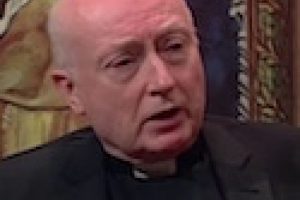Column: From the Pastor
Of the many scientific contributions made by priests, including Father Copernicus’s heliocentrism and Father Lemaître’s “Big Bang” theory, some would rank higher the invention of champagne by Dom Pérignon.
Something close to champagne had already been invented by monks near Carcassonne in the Abbey of Saint Hilaire in 1531. They were Benedictines like Pérignon, but he replaced wooden stoppers with corks and developed thicker glass bottles that enabled the production, a century or so later, of what we now call champagne.
When Dom Pérignon first tasted what he had done to Pinot Noir in 1693, he shouted: “Come my brothers, I am tasting the stars!”
Stretching that a bit, it is a good description of the Christian encountering Christ. It is more than Archimedes shouting “Eureka!” when he discovered a principle of hydraulics, because it is an embrace of eternity. So Saint Peter declares, in telling us to obey the prophecy of Scripture “like a light that shines in a dark place, until the day dawns, and the day star arises in your hearts” (2 Peter 1:19).
In Christ’s revelation of heavenly joy, he describes himself as the first of all stars: “I, Jesus, have sent mine angel to testify unto you these things in the churches. I am the root and the offspring of David, and the bright morning star” (Revelation 22:16).
He appears to us first like a distant light, like Venus rising as a portent of the sun about to appear. As the Morning star, Christ contradicts the Anti-Christ, Lucifer, who once was called a bearer of light and even the Morning Star, before his fall: “How you have fallen from heaven, O morning star, son of the dawn! You have been cast down to the earth, you who once laid low the nations!” (Isaiah 14:12)
We are living in a kind of chiaroscuro time in history, alternating light and dark, effervescence and despair, and in this the stars can be a reflection of the human condition.
Antoine de Saint-Exupéry writes in The Little Prince that “All men have stars, but they are not the same things for different people. For some, who are travelers, the stars are guides. For others they are no more than little lights in the sky. For others, who are scholars, they are problems. … But all these stars are silent.”
Saint-Exupéry’s point is that star gazing can make one feel very much alone until there is a perception of the meaning of life, which requires a vision not by the eye but by the heart. Only when Saint Paul was blinded, could he truly see Christ, and it was like tasting the stars.
Or, as Shakespeare wrote in what can be transposed to a description of Christ the Morning Star:
And he will make the face of heaven so fine
That all the world will be in love with night
And pay no worship to the garish sun.
Faithfully yours in Christ,
Father George W. Rutler
————-
Fr. George W. Rutler, S.T.D., is a brilliant scholar, author, convert, former pastor of Our Saviour in Midtown Manhattan, the closest Catholic parish near the site of 9-11, and now pastor of St Michael’s parish in Hell’s Kitchen, New York City. A donation of any amount may be made to the parish at: www.StMichaelNYC.com.
Father Rutler’s latest book: Our Peculiar Times. This “timely set of reflections on the ominous times in which we are living” is a must-read!
View Articles Father Rutler was ordained to the diaconate in Rome by His Eminence William Cardinal Baum in 1980 and received priestly ordination in St. Patrick's... MORE »



You must be logged in to post a comment.